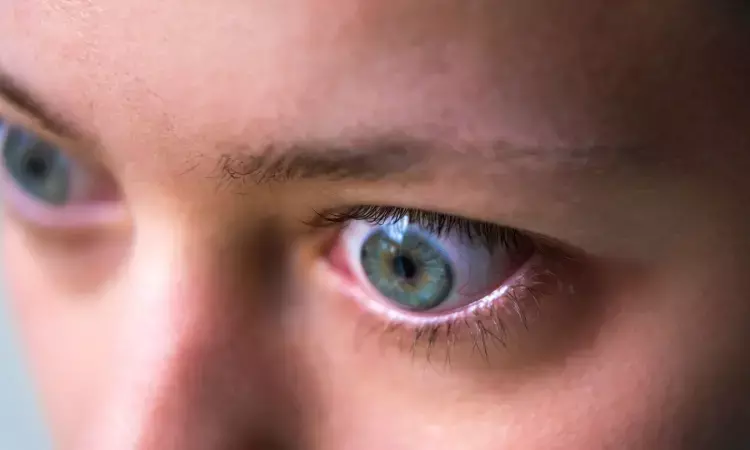- Home
- Medical news & Guidelines
- Anesthesiology
- Cardiology and CTVS
- Critical Care
- Dentistry
- Dermatology
- Diabetes and Endocrinology
- ENT
- Gastroenterology
- Medicine
- Nephrology
- Neurology
- Obstretics-Gynaecology
- Oncology
- Ophthalmology
- Orthopaedics
- Pediatrics-Neonatology
- Psychiatry
- Pulmonology
- Radiology
- Surgery
- Urology
- Laboratory Medicine
- Diet
- Nursing
- Paramedical
- Physiotherapy
- Health news
- Fact Check
- Bone Health Fact Check
- Brain Health Fact Check
- Cancer Related Fact Check
- Child Care Fact Check
- Dental and oral health fact check
- Diabetes and metabolic health fact check
- Diet and Nutrition Fact Check
- Eye and ENT Care Fact Check
- Fitness fact check
- Gut health fact check
- Heart health fact check
- Kidney health fact check
- Medical education fact check
- Men's health fact check
- Respiratory fact check
- Skin and hair care fact check
- Vaccine and Immunization fact check
- Women's health fact check
- AYUSH
- State News
- Andaman and Nicobar Islands
- Andhra Pradesh
- Arunachal Pradesh
- Assam
- Bihar
- Chandigarh
- Chattisgarh
- Dadra and Nagar Haveli
- Daman and Diu
- Delhi
- Goa
- Gujarat
- Haryana
- Himachal Pradesh
- Jammu & Kashmir
- Jharkhand
- Karnataka
- Kerala
- Ladakh
- Lakshadweep
- Madhya Pradesh
- Maharashtra
- Manipur
- Meghalaya
- Mizoram
- Nagaland
- Odisha
- Puducherry
- Punjab
- Rajasthan
- Sikkim
- Tamil Nadu
- Telangana
- Tripura
- Uttar Pradesh
- Uttrakhand
- West Bengal
- Medical Education
- Industry
Veligrotug Shows Promising Results for Thyroid Eye Disease in Phase 3 Trial

Veligrotug demonstrated strong long-term durability and efficacy in Phase 3 THRIVE trials for thyroid eye disease, meeting both primary and secondary endpoints. These results support its upcoming Biologics License Application (BLA) submission planned for the second half of 2025.
TED is an autoimmune condition characterized by inflammation, growth, and damage to tissues around and behind the eye.
The THRIVE phase 3 clinical trial in active TED evaluated 5 infusions of veli or placebo every three weeks with primary topline analysis at week 15 and then followed patients through week 52.
Positive Veligrotug Durability at 52 Weeks
• 70% of veligrotug patients (21/30) in THRIVE, who were proptosis responders at week 15 and continued follow-up to the end of the study at week 52, maintained their proptosis response. Maintenance of response is defined as responders at week 15 who still had at least a 2-millimeter (mm) reduction in proptosis compared to baseline at week 52, without worsening in the fellow eye (≥2 mm increase), as measured by exophthalmometry.
• There were no changes to the safety profile in the follow-up period. The vast majority of adverse events reported at the week 15 primary analysis had resolved by week 52.
“We view the strength of today’s durability and safety resolution data as reinforcing veli’s strong and consistently robust clinical profile,” said Steve Mahoney, Viridian’s President and CEO. “We believe that the totality of veligrotug’s clinical data continues to demonstrate its potential to be the treatment-of-choice for patients living with TED. We believe these data, together with a streamlined dosing regimen of five infusions, position veli to become a market leading TED therapeutic, if approved. We continue to make great progress towards submitting the BLA in the second half of this year and preparing for a potential launch in 2026.”
Robust Veligrotug Topline Clinical Profile for Active and Chronic TED
As announced in late 2024, veligrotug met all of its primary and secondary endpoints and was generally well-tolerated in its pivotal phase 3 clinical trials, THRIVE and THRIVE-2, for active and chronic TED, respectively. Veligrotug demonstrated a rapid onset of treatment effect and statistically significant and clinically meaningful reduction and resolution of diplopia in both clinical trials. THRIVE-2 was the first data set from a global phase 3 clinical trial in chronic TED patients to demonstrate statistically significant diplopia response and resolution. Together, THRIVE and THRIVE-2 comprise the largest pivotal program to date in TED.
About Veligrotug
Veligrotug is an intravenously (IV) delivered, anti-insulin-like growth factor-1 receptor (IGF-1R) antibody in phase 3 development for thyroid eye disease, with the potential to be the IV treatment-of-choice for active and chronic TED patients. IGF-1R is a clinically and commercially validated target for thyroid eye disease (TED) with U.S. revenues of approximately $2 billion in 2024. Veligrotug has the potential to improve patient experience with a differentiated dosing regimen that features a shorter infusion time and fewer infusions compared to the currently approved and marketed IGF-1R inhibitor.
In its pivotal phase 3 clinical trials, THRIVE and THRIVE-2, veligrotug met all of its primary and secondary endpoints. Veligrotug demonstrated a rapid onset of treatment effect and statistically significant and clinically meaningful reduction and resolution of diplopia in both clinical trials. THRIVE-2 was the first demonstration in a global phase 3 clinical trial of a statistically significant diplopia response and resolution in chronic TED patients. Veligrotug was generally well tolerated.
Viridian believes that the robust veligrotug clinical profile has the potential to establish a strong position in the TED commercial market, if approved, and may help facilitate the introduction of VRDN-003, its potential best-in-class subcutaneous IGF-1R antibody for TED.
Dr Kamal Kant Kohli-MBBS, DTCD- a chest specialist with more than 30 years of practice and a flair for writing clinical articles, Dr Kamal Kant Kohli joined Medical Dialogues as a Chief Editor of Medical News. Besides writing articles, as an editor, he proofreads and verifies all the medical content published on Medical Dialogues including those coming from journals, studies,medical conferences,guidelines etc. Email: drkohli@medicaldialogues.in. Contact no. 011-43720751


